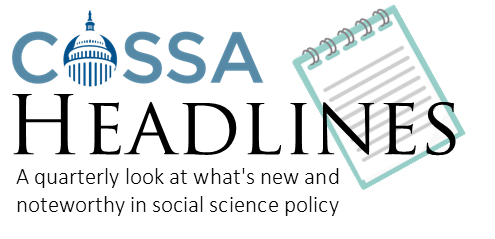Issue 17 (August 31)
OSTP Prepares Upcoming Research Security Guidance
On August 10, Dr. Eric Lander, Director of the White House Office of Science and Technology Policy (OSTP) announced the Biden Administration’s intent to develop guidance for federal agencies to implement research security provisions over the following 90 days. The guidance would provide clear rules for federal agencies to comply with the National Security Presidential Memorandum (NSPM-33), issued in the final days of the Trump Administration. Among other provisions, NSPM-33 recommends standard research security measures across federal research agencies and clarifies disclosure requirements of foreign support for federally-funded scientists (see previous COSSA coverage for more details). In addition, on August 11, leadership from OSTP and the National Science Foundation (NSF) met with a private forum of leaders from around the academic and research community to discuss feedback on the implementation guidance.
Lander’s announcement states the NSPM-33 guidance will address three major areas within research security:
- disclosure policies for foreign funding and potential conflicts of interest,
- oversight and enforcement policies for research security violations, and
- support for research security programs at federally funded research organizations.
The announcement also asserts that while these policies are intended to counteract espionage efforts such as those undertaken by the Chinese government, efforts will be made to avoid fueling anti-Asian discrimination and xenophobia. OSTP will be accepting community and stakeholder feedback on the NSPM-33 guidance at researchsecurity@ostp.eop.gov through the 90 days following the announcement.
September Headlines to Feature Deep Dive with IES Director

COSSA members can sign up for the monthly Headlines webchat to catch up on the most important social and behavioral science news from the past month and answer your questions. Stick around for our deep dive discussion on the Institute of Education Sciences (IES), with IES Director Mark Schneider. Individuals employed by or affiliated with a COSSA member organization or university can register for the webchat here.
FROM THE ARCHIVES: House, Senate Agree to Kill Technology Office (July 31, 1995)
In celebration of COSSA’s 40th anniversary, we are diving into the decades of Washington Update archives to share articles from years past that resonate with today’s news.
A House-Senate conference committee on the Legislative Branch Appropriations bill has agreed to kill the Office of Technology Assessment (OTA). The House had voted to move OT A’s functions to the Congressional Research Service and provided $15 million of Library of Congress appropriations for that purpose. OT A’s budget in FY 1995 was $22 million. An attempt by Sen. Ernest Hollings (D-SC) to save the Office during Senate consideration of the appropriations bill on July 20 failed when his amendment was tabled by a vote of 54-45.
Created in 1972 to provide technical advice to the Congress, OT A produced numerous reports on various scientific and technical matters during its 23-year history. Despite some bipartisan support in both Houses, the conference committee agreed with Sen. Harry Reid’s (D-NV) assessment that OTA was “a luxury” we can no longer afford.
OSTP and NSF Request Input on National Resource for Artificial Intelligence Research
The White House Office of Science and Technology Policy (OSTP) and the National Science Foundation (NSF) have issued a request for information (RFI) developing an implementation roadmap for a shared artificial intelligence (AI) research infrastructure. The RFI was issued through the National Artificial Intelligence Research Resource Task Force, which was directed by Congress to establish a “shared research infrastructure that would provide Artificial Intelligence (AI) researchers and students across scientific disciplines with access to computational resources, high-quality data, educational tools, and user support.” More information about the RFI is available in the Federal Register notice. Comments are due by October 1, 2021.
Census Nominee Receives Committee Approval as Delayed 2020 Data Released
On August 4, the Senate Committee on Homeland Security and Governmental Affairs voted (10-4) to advance the nomination of Dr. Robert Santos to lead the Census Bureau (see previous coverage). Santos now moves to consideration by the full Senate, but the timing of a vote to confirm him remains unclear. Ron Jarmin remains Acting Director of the Census Bureau.
The Census Bureau released redistricting data from the 2020 Census on August 14, the second major data release from the decennial census. Compared with the previously released apportionment data, the redistricting data paints a much more detailed geographic and demographic picture of the U.S. population. The release of the data had been delayed due to the disruptions caused by the pandemic, a source of concerns for states who rely on it to draw voting district boundaries. The data files are also the first to be protected using differential privacy, a technique that protects individual records from reidentification by adding a carefully calibrated level of “noise” to the data. More information about the data is available on the Census Bureau’s website.
National Academies Seeking Director for the Board on Behavioral, Cognitive, and Sensory Sciences
The National Academies of Sciences, Engineering, and Medicine (NASEM) announced a position opening for the Board Director of the Board on Behavioral, Cognitive, and Sensory Sciences (BBCSS). The Director is responsible for leading the cross-disciplinary body supporting programs, sponsorships, employee development within the Division of Behavioral and Social Sciences and Education (DBASSE). More information is available on the NASEM website.

